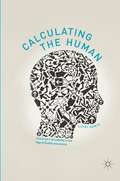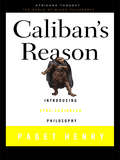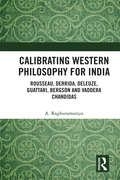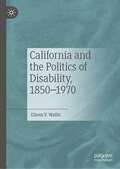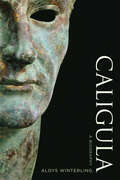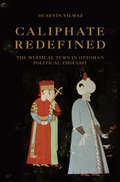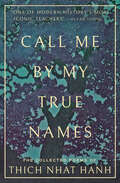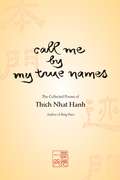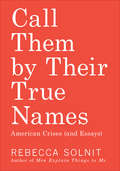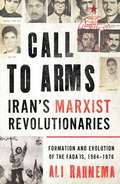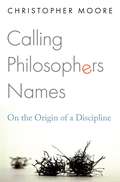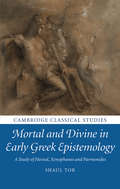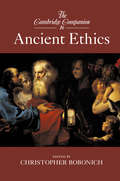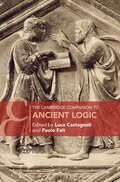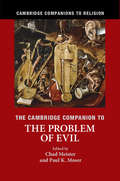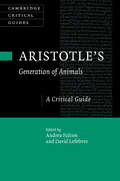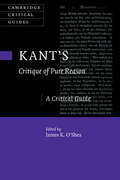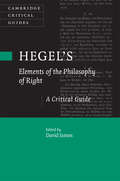- Table View
- List View
Calculating the Human
by Luigi DoriaWhy does contemporary calculation develop as calculation of the quality of everything? How should we consider calculation of quality and the relationship between calculation and enhancement of life? These and related questions are addressed through phenomenological investigation and a critical analysis of the social science debate.
Caliban's Reason: Introducing Afro-Caribbean Philosophy (Africana Thought)
by Paget HenryPaget introduces the general reader to Afro-Caribbean philosophy in this ground-breaking work. Since Afro-Caribbean thought is inherently hybrid in nature, he traces the roots of this discourse in traditional African thought and in the Christian and Enlightenment traditions of Western Europe.
Calibrating Western Philosophy for India: Rousseau, Derrida, Deleuze, Guattari, Bergson and Vaddera Chandidas
by A. RaghuramarajuThis book proposes a new way of reading modern Western philosophers in the Indian context. It questions the colonial methodology, or the practice of importing theories of Western philosophy, and shows how its unmediated applications are often incongruent, irrelevant, and unproductive in local frameworks. The author shows an alternative route to approaching philosophers from the West – Rousseau, Derrida, Deleuze, Guattari, and Bergson – by bending and reassembling aspects of their ideas and theories to relate with the diversity and complexity of Indian society. He also offers insights on the politics of non-being and negation from a neglected modern Indian philosopher, Vaddera Chandidas, as a step forward from the Western philosophers presented here. An intervention in philosophical research methodology, this volume will interest scholars and researchers of philosophy, Western philosophy, Indian philosophy, comparative studies, postcolonial studies, literature, cultural studies, and political philosophy.
California and the Politics of Disability, 1850–1970
by Eileen V. WallisThis book explores the political, legal, medical, and social battles that led to the widespread institutionalization of Californians with disabilities from the gold rush to the 1970s. By the early twentieth century, most American states had specialized facilities dedicated to both the care and the control of individuals with disabilities. Institutions reflect the lived historical experience of many Americans with disabilities in this era. Yet we know relatively little about how such state institutions fit into specific regional, state, or local contexts west of the Mississippi River; how those contexts shaped how institutions evolved over time; or how regional institutions fit into the USA’s contentious history of care and control of Americans with mental and developmental disabilities. This book examines how medical, social, and political arguments that individuals with disabilities needed to be institutionalized became enshrined in state law in California through the creation of a “bureaucracy of disability.” Using Los Angeles County as a case study, the book also considers how the friction between state and county policy in turn influenced the treatment of individuals within such facilities. Furthermore, the book tracks how the mission and methods of such institutions evolved over time, culminating in the 1960s with the birth of the disability rights movement and the complete rewriting of California’s laws on the treatment and rights of Californians with disabilities. This book is a must-read for those interested in the history of California and the American West and for anyone interested in how the intersections of disability, politics, and activism shaped our historical understanding of life for Americans with disabilities.
Caligula
by Paul Psoinos Aloys Winterling Deborah Lucas Schneider Glenn W. MostThe infamous emperor Caligula ruled Rome from A.D. 37 to 41 as a tyrant who ultimately became a monster. An exceptionally smart and cruelly witty man, Caligula made his contemporaries worship him as a god. He drank pearls dissolved in vinegar and ate food covered in gold leaf. He forced men and women of high rank to have sex with him, turned part of his palace into a brothel, and committed incest with his sisters. He wanted to make his horse a consul. Torture and executions were the order of the day. Both modern and ancient interpretations have concluded from this alleged evidence that Caligula was insane. But was he? This biography tells a different story of the well-known emperor. In a deft account written for a general audience, Aloys Winterling opens a new perspective on the man and his times. Basing Caligula on a thorough new assessment of the ancient sources, he sets the emperor's story into the context of the political system and the changing relations between the senate and the emperor during Caligula's time and finds a new rationality explaining his notorious brutality.
Caliphate Redefined: The Mystical Turn in Ottoman Political Thought
by Hüseyin YılmazThe medieval theory of the caliphate, epitomized by the Abbasids (750–1258), was the construct of jurists who conceived it as a contractual leadership of the Muslim community in succession to the Prophet Muhammed’s political authority. In this book, Hüseyin Yilmaz traces how a new conception of the caliphate emerged under the Ottomans, who redefined the caliph as at once a ruler, a spiritual guide, and a lawmaker corresponding to the prophet’s three natures.Challenging conventional narratives that portray the Ottoman caliphate as a fading relic of medieval Islamic law, Yilmaz offers a novel interpretation of authority, sovereignty, and imperial ideology by examining how Ottoman political discourse led to the mystification of Muslim political ideals and redefined the caliphate. He illuminates how Ottoman Sufis reimagined the caliphate as a manifestation and extension of cosmic divine governance. The Ottoman Empire arose in Western Anatolia and the Balkans, where charismatic Sufi leaders were perceived to be God’s deputies on earth. Yilmaz traces how Ottoman rulers, in alliance with an increasingly powerful Sufi establishment, continuously refashioned and legitimated their rule through mystical imageries of authority, and how the caliphate itself reemerged as a moral paradigm that shaped early modern Muslim empires.A masterful work of scholarship, Caliphate Redefined is the first comprehensive study of premodern Ottoman political thought to offer an extensive analysis of a wealth of previously unstudied texts in Arabic, Persian, and Ottoman Turkish.
Call Me By My True Names: The Collected Poems of Thich Nhat Hanh
by Thich Nhat Hanh"Thich Nhat Hanh's work has proven to be the antidote to our modern pain and sorrows." —Ocean Vuong The definitive poetry collection by the world renowned Zen master, peace activist, and author of The Miracle of MindfulnessThough he is best known for his groundbreaking and accessible works on applying mindfulness to everyday life, Thich Nhat Hanh is also a distinguished poet and Nobel Peace Prize nominee. This stunning poetry collection explores these lesser-known facets of Nhat Hanh&’s life, revealing not only his path to becoming a Zen meditation teacher but his skill as a poet, his achievements as a peace activist, and his experiences as a young refugee.Through more than fifty poems spanning several decades, Nhat Hanh reveals the stories of his past—from his childhood in war-torn Vietnam to the beginnings of his own spiritual journey—and shares his ideas on how we can come together to create a more peaceful, compassionate world. Uplifting, insightful, and profound, Call Me By My True Names is at once an exquisite work of poetry and a portrait of one of the world&’s greatest Zen masters and peacemakers.
Call Me by My True Names: The Collected Poems
by Thich Nhat Hanh"The clear, still mind of this meditation teacher gives rise to piercing images time and time again. Nhat Hanh seems an inherently skilled poet.It is these poetic works,more than his essays or lectures, that show Thich Nhat Hanh clearly to be a Zen mystic". San Francisco Chronicle, "Thich Nhat Hanh's poems have an almost uncanny power to disarm delusion, awaken compassion, and carry the mind into the immediate presence of meditation. Thich Nhat Hanh writes with the voice of the Buddha". - Sogyal Rinpoche.
Call Them by Their True Names: American Crises (and Essays)
by Rebecca Solnit&“[A] call to arms that takes on a range of social and political problems in America—from racism and misogyny to climate change and Donald Trump&” (Poets & Writers). National Book Award LonglistWinner of the Kirkus Prize for NonfictionWinner of the Foreword INDIE Editor&’s Choice Prize for Nonfiction Rebecca Solnit is the author of more than twenty books, including the international bestseller Men Explain Things to Me. Called &“the voice of the resistance&” by the New York Times, she has emerged as an essential guide to our times, through incisive commentary on feminism, violence, ecology, hope, and everything in between. In this powerful and wide-ranging collection of essays, Solnit turns her attention to the war at home. This is a war, she says, &“with so many casualties that we should call it by its true name, this war with so many dead by police, by violent ex-husbands and partners and lovers, by people pursuing power and profit at the point of a gun or just shooting first and figuring out who they hit later.&” To get to the root of these American crises, she contends that &“to acknowledge this state of war is to admit the need for peace,&” countering the despair of our age with a dose of solidarity, creativity, and hope. &“Solnit&’s exquisite essays move between the political and the personal, the intellectual and the earthy.&” —Elle &“Solnit is careful with her words (she always is) but never so much that she mutes the infuriated spirit that drives these essays.&” —Kirkus Reviews (starred review) &“Solnit [is] a powerful cultural critic: as always, she opts for measured assessment and pragmatism over hype and hysteria.&” —Publishers Weekly &“Essential reading for anyone living in America today.&” —The Brooklyn Rail
Call to Arms: Formation and Evolution of the Fada'is, 1964–1976 (Radical Histories of the Middle East)
by Ali RahnemaOn 8 February 1971, Marxist revolutionaries attacked the gendarmerie outpost at the village of Siyahkal in Iran&’s Gilan province. Barely two months later, the Iranian People&’s Fada&’i Guerrillas officially announced their existence and began a long, drawn-out urban guerrilla war against the Shah&’s regime. In Call to Arms, Ali Rahnema provides a comprehensive history of the Fada&’is, beginning by asking why so many of Iran&’s best and brightest chose revolutionary Marxism in the face of absolutist rule. He traces how radicalised university students from different ideological backgrounds morphed into the Marxist Fada&’is in 1971, and sheds light on their theory, practice and evolution. While the Fada&’is failed to directly bring about the fall of the Shah, Rahnema shows they had a lasting impact on society and they ultimately saw their objective achieved.
Calling Philosophers Names: On the Origin of a Discipline
by Christopher MooreAn original and provocative book that illuminates the origins of philosophy in ancient Greece by revealing the surprising early meanings of the word "philosopher"Calling Philosophers Names provides a groundbreaking account of the origins of the term philosophos or "philosopher" in ancient Greece. Tracing the evolution of the word's meaning over its first two centuries, Christopher Moore shows how it first referred to aspiring political sages and advice-givers, then to avid conversationalists about virtue, and finally to investigators who focused on the scope and conditions of those conversations. Questioning the familiar view that philosophers from the beginning "loved wisdom" or merely "cultivated their intellect," Moore shows that they were instead mocked as laughably unrealistic for thinking that their incessant talking and study would earn them social status or political and moral authority.Taking a new approach to the history of early Greek philosophy, Calling Philosophers Names seeks to understand who were called philosophoi or "philosophers" and why, and how the use of and reflections on the word contributed to the rise of a discipline. Drawing on a wide range of evidence, the book demonstrates that a word that began in part as a wry reference to a far-flung political bloc came, hardly a century later, to mean a life of determined self-improvement based on research, reflection, and deliberation. Early philosophy dedicated itself to justifying its own dubious-seeming enterprise. And this original impulse to seek legitimacy holds novel implications for understanding the history of the discipline and its influence.
Cambridge Classical Studies: A Study of Hesiod, Xenophanes and Parmenides (Cambridge Classical Studies)
by Shaul TorThis book demonstrates that we need not choose between seeing so-called Presocratic thinkers as rational philosophers or as religious sages. In particular, it rethinks fundamentally the emergence of systematic epistemology and reflection on speculative inquiry in Hesiod, Xenophanes and Parmenides. Shaul Tor argues that different forms of reasoning, and different models of divine disclosure, play equally integral, harmonious and mutually illuminating roles in early Greek epistemology. Throughout, the book relates these thinkers to their religious, literary and historical surroundings. It is thus also, and inseparably, a study of poetic inspiration, divination, mystery initiation, metempsychosis and other early Greek attitudes to the relations and interactions between mortal and divine. The engagements of early philosophers with such religious attitudes present us with complex combinations of criticisms and creative appropriations. Indeed, the early milestones of philosophical epistemology studied here themselves reflect an essentially theological enterprise and, as such, one aspect of Greek religion.
Cambridge Classical Studies: Aristotle on Female Animals
by Sophia M. ConnellAristotle's account of female nature has received mostly negative treatment, emphasising what he says females cannot do. Building on recent research, this book comprehensively revises such readings, setting out the complex and positive role played by the female in Aristotle's thought with a particular focus on the longest surviving treatise on reproduction in the ancient corpus, the Generation of Animals. It provides new interpretations of the nature of Aristotle's sexism, his theory of male and female interaction in generation, and his account of inherited features. It also discusses a range of more general issues which can and should be re-examined in light of Aristotle's account of female animals: his methodology, hylomorphism, teleology and psychology. Aristotle on Female Animals will be valuable to all those interested in Aristotle's philosophy and the history of gender.
Cambridge Classical Studies: Justice and Reciprocity in Aristotle's Political Philosophy
by Kazutaka InamuraThis book illustrates how Aristotle's ethical concepts such as justice, reciprocity and friendship offer a basis for his political philosophy. In particular, it points out the importance of Aristotle for articulating the concept of a civic relationship and developing a theory of integration, by exploring how he includes a wide variety of people within the deliberative and judicial processes. Comparisons between Aristotle's own thought and present-day 'Aristotelian' political theories, such as communitarianism, civic republicanism and the capabilities approach, are also among the unique approaches offered by the book and are used to illustrate his original vision of politics. They can also, however, offer new insights into the problems of how to read his texts appropriately in their context and why we now need to read them, not only out of an antiquarian interest but also out of our concern for politics.
Cambridge Companions to Philosophy: The Cambridge Companion to Ancient Ethics (Cambridge Companions to Philosophy)
by Christopher BobonichThe field of ancient Greek ethics is increasingly emerging as a major branch of philosophical enquiry, and students and scholars of ancient philosophy will find this Companion to be a rich and invaluable guide to the themes and movements which characterised the discipline from the Pre-Socratics to the Neo-Platonists. Several chapters are dedicated to the central figures of Plato and Aristotle, and others explore the ethical thought of the Stoics, the Epicureans, the Skeptics, and Plotinus. Further chapters examine important themes that cut across these schools, including virtue and happiness, friendship, elitism, impartiality, and the relationship between ancient eudaimonism and modern morality. Written by leading scholars and drawing on cutting-edge research to illuminate the questions of ancient ethics, the book will provide students and specialists with an indispensable critical overview of the full range of ancient Greek ethics.
Cambridge Companions to Philosophy: The Cambridge Companion to Ancient Logic (Cambridge Companions To Philosophy Ser.)
by Luca Castagnoli Paolo FaitCambridge Companions to Philosophy: The Cambridge Companion to Popper
by Jeremy Shearmur Geoffrey StokesKarl Popper was one of the most influential philosophers of the twentieth century. His criticism of induction and his falsifiability criterion of demarcation between science and non-science were major contributions to the philosophy of science. Popper's broader philosophy of critical rationalism comprised a distinctive philosophy of social science and political theory. His critique of historicism and advocacy of the open society marked him out as a significant philosopher of freedom and reason. This book sets out the historical and intellectual contexts in which Popper worked, and offers an overview and diverse criticisms of his central ideas. The volume brings together contributors with expertise on Popper's work, including people personally associated with Popper (such as Jarvie, Miller, Musgrave, Petersen and Shearmur), specialists on the topics treated (Bradie, Godfrey-Smith and Jackson), and scholars with special interests in aspects of Popper's work (Andersson, Hacohen, Maxwell and Stokes).
Cambridge Companions to Philosophy: The Cambridge Companion to The Communist Manifesto
by Terrell Carver James FarrThe Cambridge Companion to The Communist Manifesto covers the historical and biographical contexts and major contemporary interpretations of this classic text for understanding Marx and Engels, and for grasping Marxist political theory. The editors and contributors offer innovative accounts of the history of the text in relation to German revolutionaries, European socialism, and socialist political projects; rhetorical, dramaturgical, feminist and postcolonial readings of the text; and theoretical analyses in relation to political economy, political theory and major concepts of Marxism. The volume includes a fresh translation into English, by Terrell Carver, of the first edition (1848), and an exacting transcription of the rare earliest English translation (1850) by Helen Macfarlane.
Cambridge Companions to Religion: The Cambridge Companion to The Problem of Evil (Cambridge Companions to Religion)
by Chad Meister Moser Paul K.For many centuries philosophers have been discussing the problem of evil - one of the greatest problems of intellectual history. There are many facets to the problem, and for students and scholars unfamiliar with the vast literature on the subject, grasping the main issues can be a daunting task. This Companion provides a stimulating introduction to the problem of evil. More than an introduction to the subject, it is a state-of-the-art contribution to the field which provides critical analyses of and creative insights on this longstanding problem. Fresh themes in the book include evil and the meaning of life, beauty and evil, evil and cosmic evolution, and anti-theodicy. Evil is discussed from the perspectives of the major monotheistic religions, agnosticism, and atheism. Written by leading scholars in clear and accessible prose, this book is an ideal companion for undergraduate and graduate students, teachers, and scholars across the disciplines.
Cambridge Critical Guides: A Critical Guide (Cambridge Critical Guides)
by Andrea Falcon David LefebvreGeneration of Animals is one of Aristotle's most mature, sophisticated, and carefully crafted scientific writings. His overall goal is to provide a comprehensive and systematic account of how animals reproduce, including a study of their reproductive organs, what we would call fertilization, embryogenesis, and organogenesis. In this book, international experts present thirteen original essays providing a philosophically and historically informed introduction to this important work. They shed light on the unity and structure of the Generation of Animals, the main theses that Aristotle defends in the work, and the method of inquiry he adopts. They also open up new avenues of exploration of this difficult and still largely unexplored work. The volume will be essential for scholars and students of ancient philosophy as well as of the history and philosophy of science.
Cambridge Critical Guides: A Critical Guide (Cambridge Critical Guides)
by James R. O'SheaKant's monumental book the Critique of Pure Reason was arguably the most conceptually revolutionary work in the history of philosophy and its impact continues to be felt throughout philosophical debates today. However, it is a notoriously difficult work whose basic meaning and lasting philosophical significance are both subject to ongoing controversy. In this Critical Guide, an international team of leading Kant scholars addresses the challenges, clarifying Kant's basic terms and arguments and engaging with the debates that surround this central text. Providing compact explanations along with cutting-edge interpretations of nearly all of the main themes and arguments in Kant's Critique, this volume provides well-balanced arguments on such controversial topics as the interpretation of Kant's transcendental idealism, conceptualism and non-conceptual content in perception, and the soundness of his transcendental arguments. This volume will engage readers of Kant at all levels.
Cambridge Critical Guides: Aquinas’s Disputed Questions on Evil
by M. V. DoughertyThomas Aquinas's Disputed Questions on Evil is a careful and detailed analysis of the general topic of evil, including discussions on evil as privation, human free choice, the cause of moral evil, moral failure, and the so-called seven deadly sins. This collection of ten, specially commissioned new essays, the first book-length English-language study of Disputed Questions on Evil, examines the most interesting and philosophically relevant aspects of Aquinas's work, highlighting what is distinctive about it and situating it in relation not only to Aquinas's other works but also to contemporary philosophical debates in metaphysics, ethics, and philosophy of action. The essays also explore the history of the work's interpretation. The volume will be of interest to researchers in a broad range of philosophical disciplines including medieval philosophy and history of philosophy, as well as to theologians.
Cambridge Critical Guides: Aristotle’s Physics
by Mariska LeunissenAristotle's study of the natural world plays a tremendously important part in his philosophical thought. He was very interested in the phenomena of motion, causation, place and time, and teleology, and his theoretical materials in this area are collected in his Physics, a treatise of eight books which has been very influential on later thinkers. This volume of new essays provides cutting-edge research on Aristotle's Physics, taking into account recent changes in the field of Aristotle in terms of its understanding of key concepts and preferred methodology. The contributions reassess the key concepts of the treatise (including nature, chance, teleology, art, and motion), reconstruct Aristotle's methods for the study of nature, and determine the boundaries of his natural philosophy. Because of the foundational nature of Aristotle's Physics itself, the volume will be a must-read for all scholars working on Aristotle.
Cambridge Critical Guides: Aristotle’s Politics
by Lockwood, Thornton and Samaras, Thanassis Thornton Lockwood Thanassis SamarasArguably the foundational text of Western political theory, Aristotle's Politics has become one of the most widely and carefully studied works in ethical and political philosophy. This volume of essays offers fresh interpretations of Aristotle's key work and opens new paths for students and scholars to explore. The contributors embrace a variety of methodological approaches that range across the disciplines of classics, political science, philosophy, and ancient history. Their essays illuminate perennial questions such as the relationship between individual and community, the nature of democratic deliberation, and how to improve political institutions. Offering groundbreaking studies that both set Aristotle within the context of his own time and draw on contemporary discussion of his writings, this collection will provide researchers with an understanding of many of the major scholarly debates surrounding this key text.
Cambridge Critical Guides: Hegel’s ‘Elements of the Philosophy of Right’
by David JamesHegel's Elements of the Philosophy of Right, one of the classic texts of German Idealism, is a seminal work of legal, social and political philosophy that has generated very different interpretations since its publication in 1821. Written with the advantage of historical distance, the essays in this volume adopt a fresh perspective that makes readers aware of the breadth and depth of this classic work. The themes of the essays reflect the continuing relevance of the text, and include Hegel's method, the concept of property, Hegel's view of morality, the concept of Sittlichkeit, the modern family, the nature and tensions of civil society, and the question of the modernity of the Hegelian state. The volume will be of interest to all scholars and students of German Idealism and the history of political thought.
